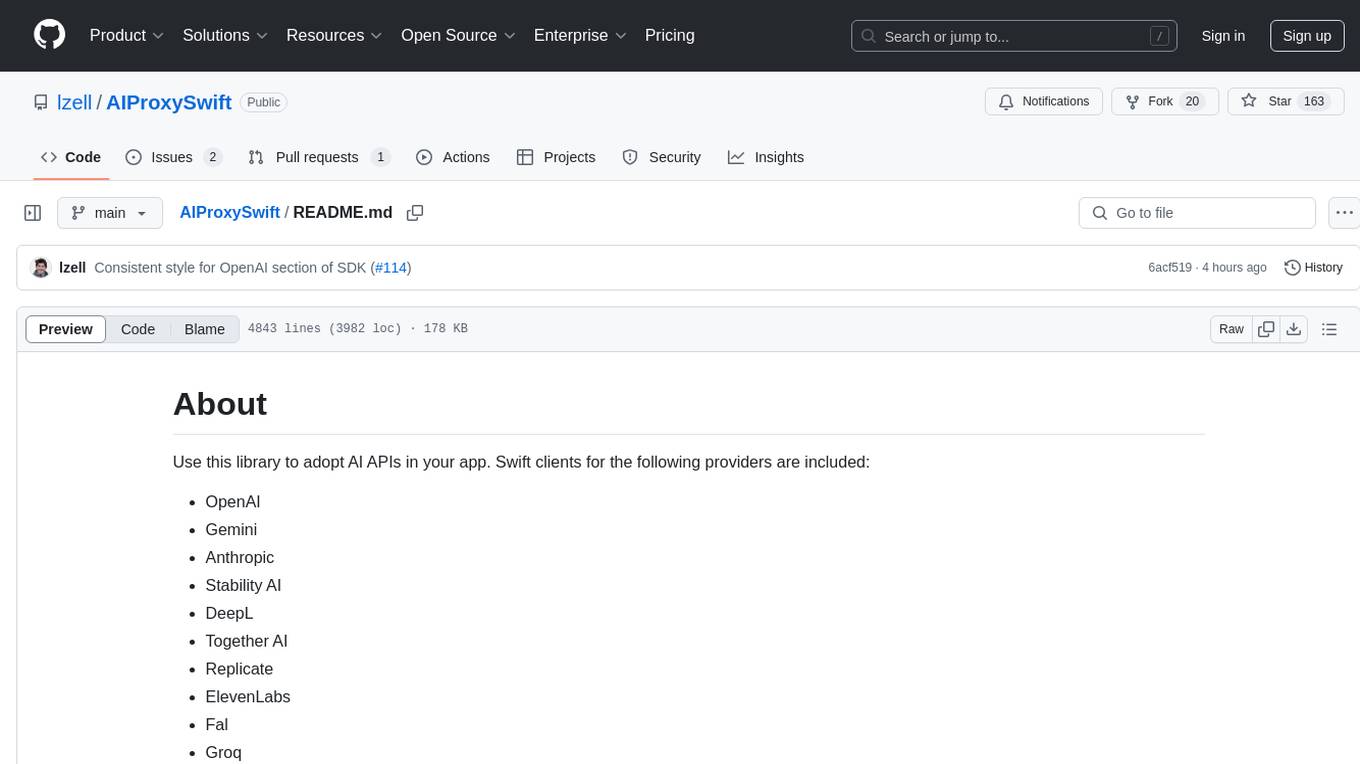
amadeus-java
Java library for the Amadeus Self-Service travel APIs
Stars: 87
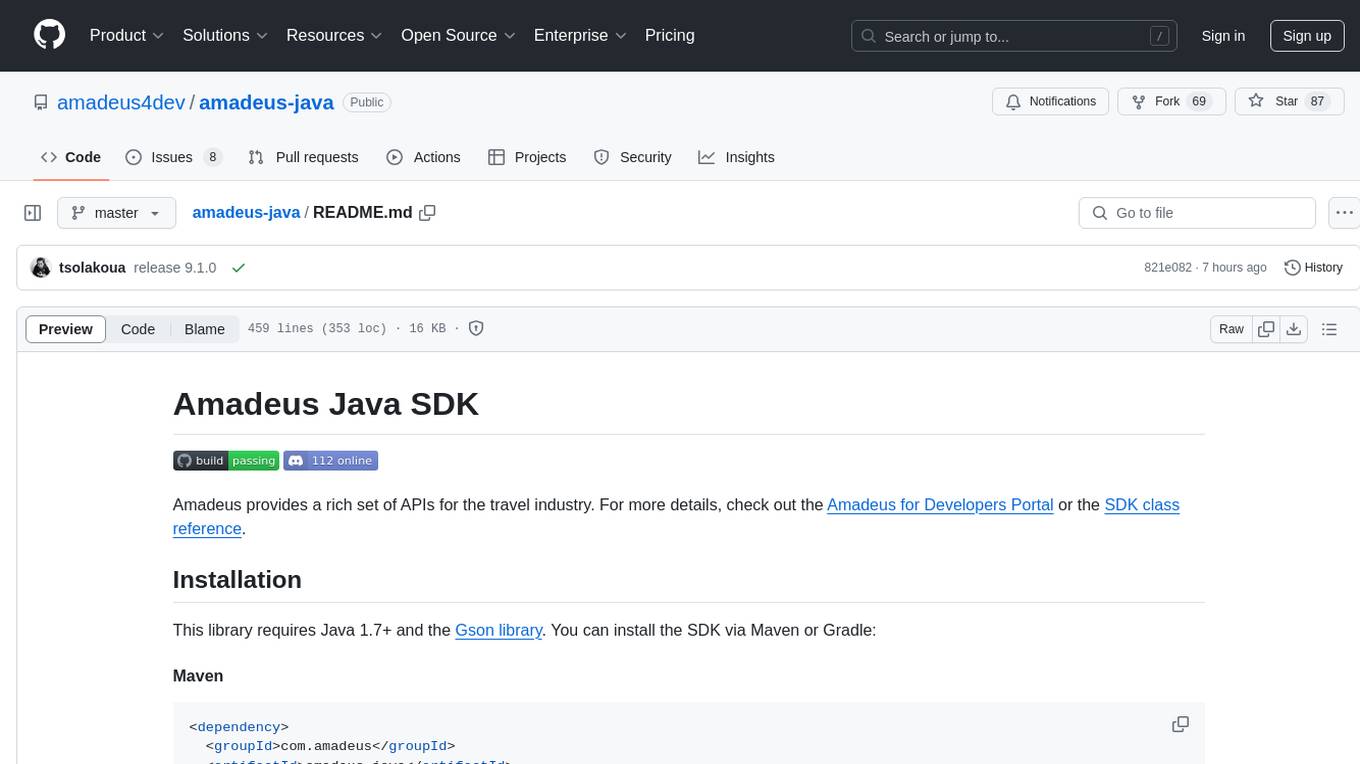
Amadeus Java SDK provides a rich set of APIs for the travel industry, allowing developers to access various functionalities such as flight search, booking, airport information, and more. The SDK simplifies interaction with the Amadeus API by providing self-contained code examples and detailed documentation. Developers can easily make API calls, handle responses, and utilize features like pagination and logging. The SDK supports various endpoints for tasks like flight search, booking management, airport information retrieval, and travel analytics. It also offers functionalities for hotel search, booking, and sentiment analysis. Overall, the Amadeus Java SDK is a comprehensive tool for integrating Amadeus APIs into Java applications.
README:
Amadeus provides a rich set of APIs for the travel industry. For more details, check out the Amadeus for Developers Portal or the SDK class reference.
This library requires Java 1.7+ and the Gson library. You can install the SDK via Maven or Gradle:
<dependency>
<groupId>com.amadeus</groupId>
<artifactId>amadeus-java</artifactId>
<version>9.1.0</version>
</dependency>compile "com.amadeus:amadeus-java:9.1.0"To make your first API call, you will need to register for an Amadeus Developer Account and set up your first application.
import com.amadeus.Amadeus;
import com.amadeus.Params;
import com.amadeus.exceptions.ResponseException;
import com.amadeus.referenceData.Locations;
import com.amadeus.resources.Location;
public class AmadeusExample {
public static void main(String[] args) throws ResponseException {
Amadeus amadeus = Amadeus
.builder("REPLACE_BY_YOUR_API_KEY", "REPLACE_BY_YOUR_API_SECRET")
.build();
Location[] locations = amadeus.referenceData.locations.get(Params
.with("keyword", "LON")
.and("subType", Locations.ANY));
System.out.println(locations);
}
}You can find all the endpoints in self-contained code examples.
The client can be initialized directly:
//Initialize using parameters
Amadeus amadeus = Amadeus
.builder("REPLACE_BY_YOUR_API_KEY", "REPLACE_BY_YOUR_API_SECRET")
.build();Alternatively, it can be initialized without any parameters if the environment variables AMADEUS_CLIENT_ID and AMADEUS_CLIENT_SECRET are present.
Amadeus amadeus = Amadeus
.builder(System.getenv())
.build();Your credentials can be found on the Amadeus dashboard.
By default the SDK is set to test environment. To switch to a production (pay-as-you-go) environment, please switch the hostname as follows:
Amadeus amadeus = Amadeus
.builder(System.getenv())
.setHostname("production")
.build();Amadeus has a large set of APIs, and our documentation is here to get you started. Head over to our reference documentation for in-depth information about every SDK method, its arguments and return types.
This library conveniently maps every API path to a similar path. For example, GET /v2/reference-data/urls/checkin-links?airlineCode=BA would be:
amadeus.referenceData.urls.checkinLinks.get(Params.with("airlineCode", "BA"));Similarly, to select a resource by ID, you can pass in the ID to the singular path. For example, GET v1/reference-data/locations/pois would be:
amadeus.referenceData.locations.pointOfInterest("9CB40CB5D0").get();You can make any arbitrary API call as well directly with the .get method.
Keep in mind, this returns a raw Resource.
Response response = amadeus.get("/v2/reference-data/urls/checkin-links", Params.with("airlineCode", "BA"));
response.getResult();Or, with POST method:
Response response = amadeus.post("/v1/shopping/availability/flight-availabilities", body);Every successful API call returns a Resource object. The Resource object has the raw response body (in string format) available:
Location[] locations = amadeus.referenceData.locations.get(Params
.with("keyword", "LON")
.and("subType", Locations.ANY));
// The raw response, as a string
locations[0].getResponse().getBody();If an API endpoint supports pagination, the other pages are available under the
.next, .previous, .last and .first methods.
Location[] locations = amadeus.referenceData.locations.get(Params
.with("keyword", "LON")
.and("subType", Locations.ANY));
// Fetches the next page
Location[] locations = (Location[]) amadeus.next(locations[0]);If a page is not available, the method will return null.
The SDK makes it easy to add your own logger.
import java.util.logging.Logger;
// Assumes the current class is called MyLogger
private final static Logger LOGGER = Logger.getLogger(MyLogger.class.getName());
...
Amadeus amadeus = Amadeus
.builder("REPLACE_BY_YOUR_API_KEY", "REPLACE_BY_YOUR_API_SECRET")
.setLogger(LOGGER)
.build();
)Additionally, to enable more verbose logging, you can set the appropriate level on your own logger. The easiest way would be to enable debugging via a parameter during initialization, or using the AMADEUS_LOG_LEVEL environment variable.
Amadeus amadeus = Amadeus
.builder("REPLACE_BY_YOUR_API_KEY", "REPLACE_BY_YOUR_API_SECRET")
.setLogLevel("debug") // or warn
.build();// Flight Inspiration Search
FlightDestination[] flightDestinations = amadeus.shopping.flightDestinations.get(Params
.with("origin", "MAD"));
// Flight Cheapest Date Search
FlightDate[] flightDates = amadeus.shopping.flightDates.get(Params
.with("origin", "MAD")
.and("destination", "MUC"));
// Flight Offers Search v2 GET
FlightOfferSearch[] flightOffersSearches = amadeus.shopping.flightOffersSearch.get(
Params.with("originLocationCode", "SYD")
.and("destinationLocationCode", "BKK")
.and("departureDate", "2023-11-01")
.and("returnDate", "2023-11-08")
.and("adults", 2)
.and("max", 3));
// Flight Offers Search v2 POST
// body can be a String version of your JSON or a JsonObject
FlightOfferSearch[] flightOffersSearches = amadeus.shopping.flightOffersSearch.post(body);
// Flight Order Management
// The flightOrderID comes from the Flight Create Orders (in test environment it's temporary)
// Retrieve a flight order
FlightOrder order = amadeus.booking.flightOrder("eJzTd9f3NjIJdzUGAAp%2fAiY=").get();
// Cancel a flight order
Response order = amadeus.booking.flightOrder("eJzTd9f3NjIJdzUGAAp%2fAiY=").delete();
// Flight Offers price
FlightPrice[] flightPricing = amadeus.shopping.flightOffersSearch.pricing.post(
body,
Params.with("include", "other-services")
.and("forceClass", "false"));
// Flight Choice Prediction
// Note that the example calls 2 APIs: Flight Offers Search & Flight Choice Prediction
FlightOfferSearch[] flightOffers = amadeus.shopping.flightOffersSearch.get(
Params.with("originLocationCode", "NYC")
.and("destinationLocationCode", "MAD")
.and("departureDate", "2024-04-01")
.and("returnDate", "2024-04-08")
.and("adults", 1));
// Using a JSonObject
JsonObject result = flightOffers[0].getResponse().getResult();
FlightOfferSearch[] flightOffersPrediction = amadeus.shopping.flightOffers.prediction.post(result);
// Using a String
String body = flightOffers[0].getResponse().getBody();
FlightOfferSearch[] flightOffersPrediction = amadeus.shopping.flightOffers.prediction.post(body);
// Flight Check-in Links
CheckinLink[] checkinLinks = amadeus.referenceData.urls.checkinLinks.get(Params
.with("airlineCode", "BA"));
// Airline Code LookUp
Airline[] airlines = amadeus.referenceData.airlines.get(Params
.with("airlineCodes", "BA"));
// Airport & City Search (autocomplete)
// Find all the cities and airports starting by the keyword 'LON'
Location[] locations = amadeus.referenceData.locations.get(Params
.with("keyword", "LON")
.and("subType", Locations.ANY));
// Get a specific city or airport based on its id
Location location = amadeus.referenceData
.location("ALHR").get();
// Airport Nearest Relevant (for London)
Location[] locations = amadeus.referenceData.locations.airports.get(Params
.with("latitude", 0.1278)
.and("longitude", 51.5074));
// City Search
City[] cities = amadeus.referenceData.locations.cities.get(Params
.with("keyword","PARIS"));
// Flight Most Booked Destinations
AirTraffic[] airTraffics = amadeus.travel.analytics.airTraffic.booked.get(Params
.with("originCityCode", "MAD")
.and("period", "2017-08"));
// Flight Most Traveled Destinations
AirTraffic[] airTraffics = amadeus.travel.analytics.airTraffic.traveled.get(Params
.with("originCityCode", "MAD")
.and("period", "2017-01"));
// Flight Busiest Traveling Period
Period[] busiestPeriods = amadeus.travel.analytics.airTraffic.busiestPeriod.get(Params
.with("cityCode", "MAD")
.and("period", "2017")
.and("direction", BusiestPeriod.ARRIVING));
// Points of Interest
// What are the popular places in Barcelona (based a geo location and a radius)
PointOfInterest[] pointsOfInterest = amadeus.referenceData.locations.pointsOfInterest.get(Params
.with("latitude", "41.39715")
.and("longitude", "2.160873"));
// What are the popular places in Barcelona? (based on a square)
PointOfInterest[] pointsOfInterest = amadeus.referenceData.locations.pointsOfInterest.bySquare.get(Params
.with("north", "41.397158")
.and("west", "2.160873")
.and("south", "41.394582")
.and("east", "2.177181"));
// Returns a single Point of Interest from a given id
PointOfInterest pointOfInterest = amadeus.referenceData.locations.pointOfInterest("9CB40CB5D0").get();
// Tours and Activities
// What are the popular activities in Barcelona (based a geo location and a radius)
Activity[] activities = amadeus.shopping.activities.get(Params
.with("latitude", "41.39715")
.and("longitude", "2.160873"));
// What are the popular activities in Barcelona? (based on a square)
Activity[] activities = amadeus.shopping.activities.bySquare.get(Params
.with("north", "41.397158")
.and("west", "2.160873")
.and("south", "41.394582")
.and("east", "2.177181"));
// Returns a single activity from a given id
Activity activity = amadeus.shopping.activity("4615").get();
// What's the likelihood flights from this airport will leave on time?
Prediction AirportOnTime = amadeus.airport.predictions.onTime.get(Params
.with("airportCode", "NCE")
.and("date", "2024-04-01"));
// What's the likelihood of a given flight to be delayed?
Prediction[] flightDelay = amadeus.travel.predictions.flightDelay.get(Params
.with("originLocationCode", "NCE")
.and("destinationLocationCode", "IST")
.and("departureDate", "2020-08-01")
.and("departureTime", "18:20:00")
.and("arrivalDate", "2020-08-01")
.and("arrivalTime", "22:15:00")
.and("aircraftCode", "321")
.and("carrierCode", "TK")
.and("flightNumber", "1816")
.and("duration", "PT31H10M"));
// Flight Create Orders to book a flight
// Using a JSonObject or String
FlightOrder createdOrder = amadeus.booking.flightOrders.post(body);
// Using a JsonObject for flight offer and Traveler[] as traveler information
// see example at src/main/java/examples/flight/createorders/FlightCreateOrders.java
FlightOrder createdOrder = amadeus.booking.flightOrders.post(flightOffersSearches, travelerArray);
// What is the the seat map of a given flight?
SeatMap[] seatmap = amadeus.shopping.seatMaps.get(Params
.with("flight-orderId", "eJzTd9f3NjIJdzUGAAp%2fAiY="));
// What is the the seat map of a given flight?
// The body can be a String version of your JSON or a JsonObject
SeatMap[] seatmap = amadeus.shopping.seatMaps.post(body);
// Trip Purpose Prediction
Prediction tripPurpose = amadeus.travel.predictions.tripPurpose.get(Params
.with("originLocationCode", "NYC")
.and("destinationLocationCode", "MAD")
.and("departureDate", "2024-04-01")
.and("returnDate", "2024-04-08"));
// Travel Recommendations
Location destinations = amadeus.referenceData.recommendedLocations.get(Params
.with("cityCodes", "PAR")
.and("travelerCountryCode", "FR"));
// On Demand Flight Status
DatedFlight[] flightStatus = amadeus.schedule.flights.get(Params
.with("carrierCode", "AZ")
.and("flightNumber", "319")
.and("scheduledDepartureDate", "2024-03-13"));
// Flight Price Analysis
ItineraryPriceMetric[] metrics = amadeus.analytics.itineraryPriceMetrics.get(Params
.with("originIataCode", "MAD")
.and("destinationIataCode", "CDG")
.and("departureDate", "2024-03-21"));
// Airport Routes
Destination[] directDestinations = amadeus.airport.directDestinations.get(Params
.with("departureAirportCode","MAD")
.and("max","2"));
// Flight Availabilites Search POST
// body can be a String version of your JSON or a JsonObject
FlightAvailability[] flightAvailabilities
= amadeus.shopping.availability.flightAvailabilities.post(body);
// Location Score GET
ScoredLocation[] scoredLocations
= amadeus.location.analytics.categoryRatedAreas.get(Params
.with("latitude", "41.397158")
.and("longitude", "2.160873"));
// Branded Fares Upsell Post
// body can be a String version of your JSON or a JsonObject
FlightOfferSearch[] upsellFlightOffers
= amadeus.shopping.flightOffers.upselling.post(body);
// Hotel List
// Get list of hotels by hotel id
Hotel[] hotels = amadeus.referenceData.locations.hotels.byHotels.get(Params
.with("hotelIds", "ADPAR001"));
// Get list of hotels by city code
Hotel[] hotels = amadeus.referenceData.locations.hotels.byCity.get(Params
.with("cityCode", "PAR"));
// Get list of hotels by a geocode
Hotel[] hotels = amadeus.referenceData.locations.hotels.byGeocode.get(Params
.with("longitude", 2.160873)
.and("latitude", 41.397158));
// Hotel autocomplete names
Hotel[] result = amadeus.referenceData.locations.hotel.get(Params
.with("keyword", "PARI")
.and("subType", "HOTEL_GDS")
.and("countryCode", "FR")
.and("lang", "EN")
.and("max", "20"));
// Hotel Offers Search API v3
// Get multiple hotel offers
HotelOfferSearch[] offers = amadeus.shopping.hotelOffersSearch.get(Params
.with("hotelIds", "MCLONGHM")
.and("adults", 1)
.and("checkInDate", "2023-11-22")
.and("roomQuantity", 1)
.and("paymentPolicy", "NONE")
.and("bestRateOnly", true));
// Get hotel offer pricing by offer id
HotelOfferSearch offer = amadeus.shopping.hotelOfferSearch("QF3MNOBDQ8").get();
// Hotel Booking
// The body can be a String version of your JSON or a JsonObject
HotelBooking[] hotel = amadeus.booking.hotelBookings.post(body);
// Hotel Booking v2
HotelOrder hotel = amadeus.booking.hotelOrders.post(body);
// Hotel Ratings / Sentiments
HotelSentiment[] hotelSentiments = amadeus.ereputation.hotelSentiments.get(Params.with("hotelIds", "ELONMFS,ADNYCCTB"));
// Airline Routes
// Get airline destinations
Destination[] destinations = amadeus.airline.destinations.get(Params
.with("airlineCode", "BA")
.and("max", 2));
// Transfer Search
TransferOffersPost[] transfers = amadeus.shopping.transferOffers.post(body);
// Transfer Booking
TransferOrder transfers = amadeus.ordering.transferOrders.post(body, params);
// Transfer Management
TransferCancellation transfers = amadeus.ordering.transferOrder("123456").transfers.cancellation.post(params);Want to contribute? Read our Contributors Guide for guidance on installing and running this code in a development environment.
This library is released under the MIT License.
You can find us on StackOverflow or join our developer community on Discord.
For Tasks:
Click tags to check more tools for each tasksFor Jobs:
Alternative AI tools for amadeus-java
Similar Open Source Tools

amadeus-java
Amadeus Java SDK provides a rich set of APIs for the travel industry, allowing developers to access various functionalities such as flight search, booking, airport information, and more. The SDK simplifies interaction with the Amadeus API by providing self-contained code examples and detailed documentation. Developers can easily make API calls, handle responses, and utilize features like pagination and logging. The SDK supports various endpoints for tasks like flight search, booking management, airport information retrieval, and travel analytics. It also offers functionalities for hotel search, booking, and sentiment analysis. Overall, the Amadeus Java SDK is a comprehensive tool for integrating Amadeus APIs into Java applications.
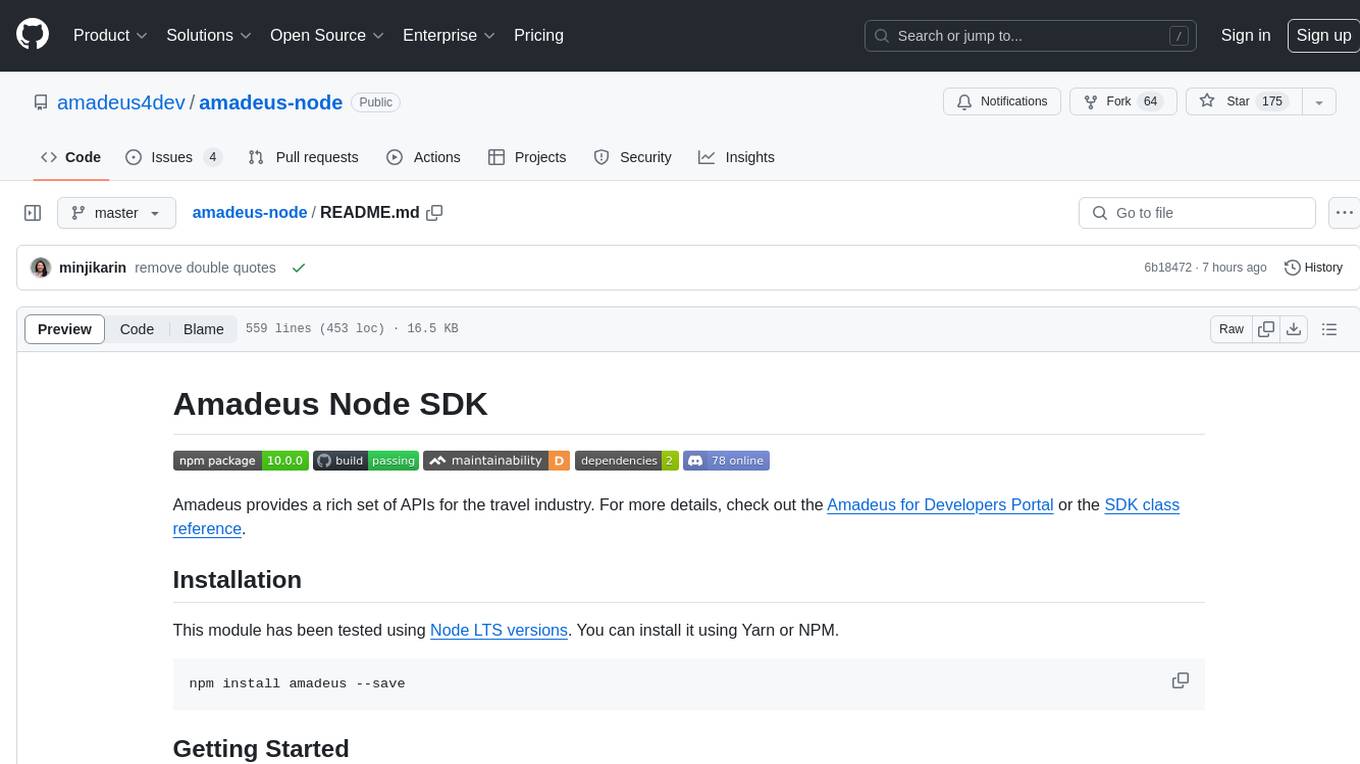
amadeus-node
Amadeus Node SDK provides a rich set of APIs for the travel industry. It allows developers to interact with various endpoints related to flights, hotels, activities, and more. The SDK simplifies making API calls, handling promises, pagination, logging, and debugging. It supports a wide range of functionalities such as flight search, booking, seat maps, flight status, points of interest, hotel search, sentiment analysis, trip predictions, and more. Developers can easily integrate the SDK into their Node.js applications to access Amadeus APIs and build travel-related applications.
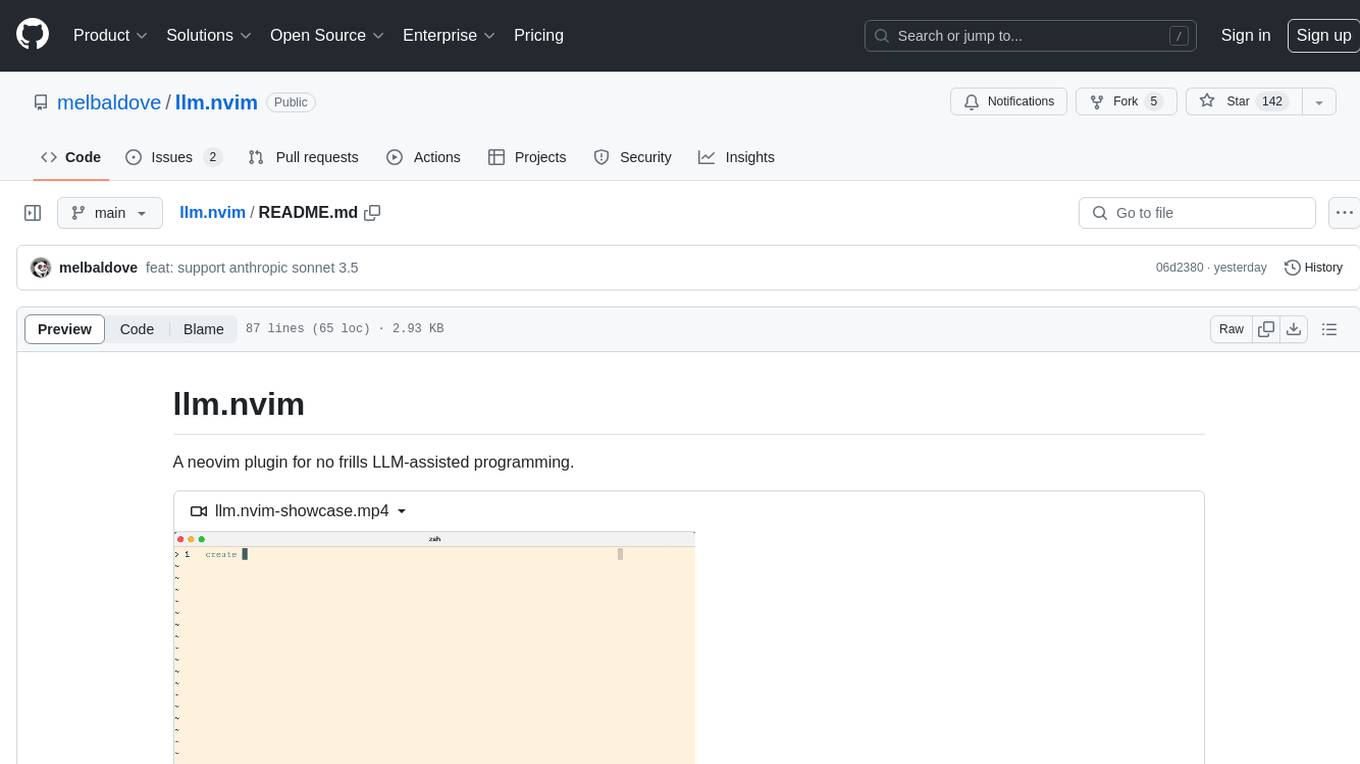
llm.nvim
llm.nvim is a neovim plugin designed for LLM-assisted programming. It provides a no-frills approach to integrating language model assistance into the coding workflow. Users can configure the plugin to interact with various AI services such as GROQ, OpenAI, and Anthropics. The plugin offers functions to trigger the LLM assistant, create new prompt files, and customize key bindings for seamless interaction. With a focus on simplicity and efficiency, llm.nvim aims to enhance the coding experience by leveraging AI capabilities within the neovim environment.
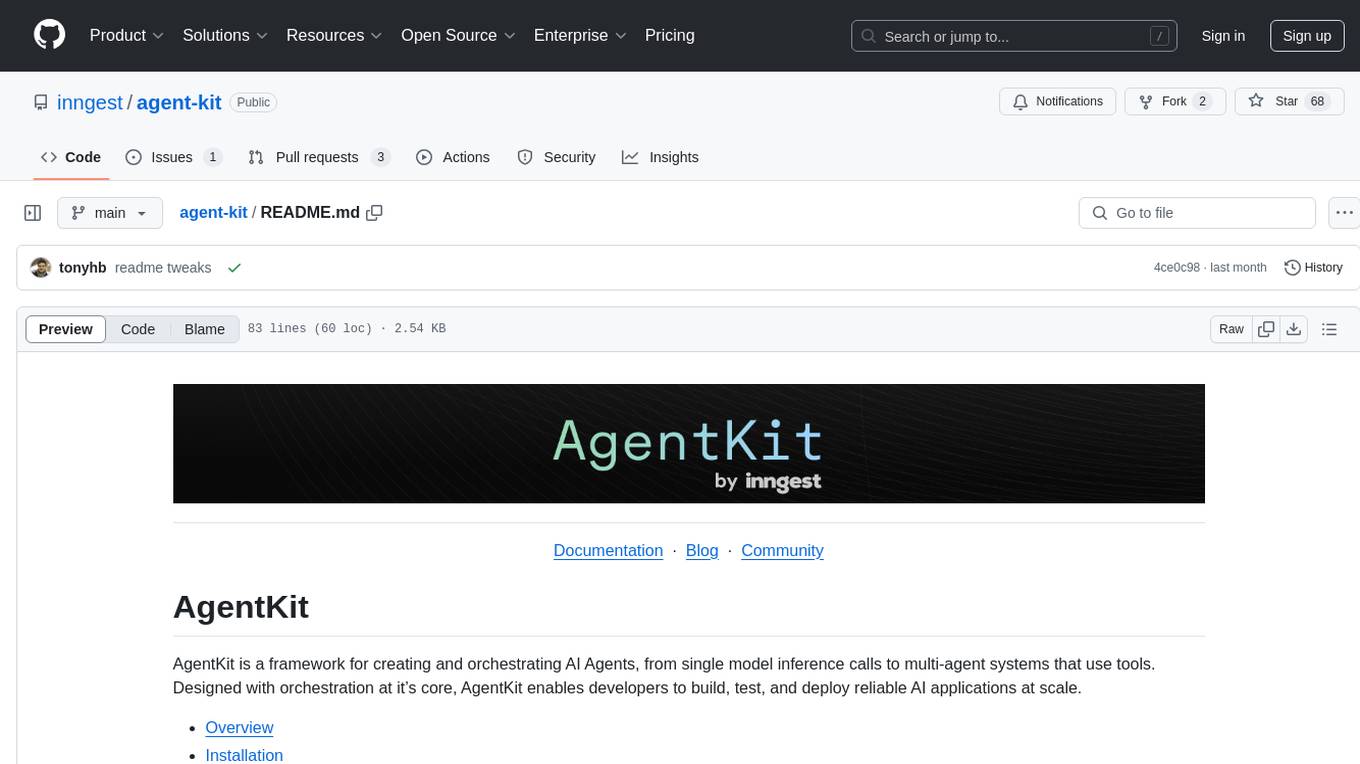
agent-kit
AgentKit is a framework for creating and orchestrating AI Agents, enabling developers to build, test, and deploy reliable AI applications at scale. It allows for creating networked agents with separate tasks and instructions to solve specific tasks, as well as simple agents for tasks like writing content. The framework requires the Inngest TypeScript SDK as a dependency and provides documentation on agents, tools, network, state, and routing. Example projects showcase AgentKit in action, such as the Test Writing Network demo using Workflow Kit, Supabase, and OpenAI.
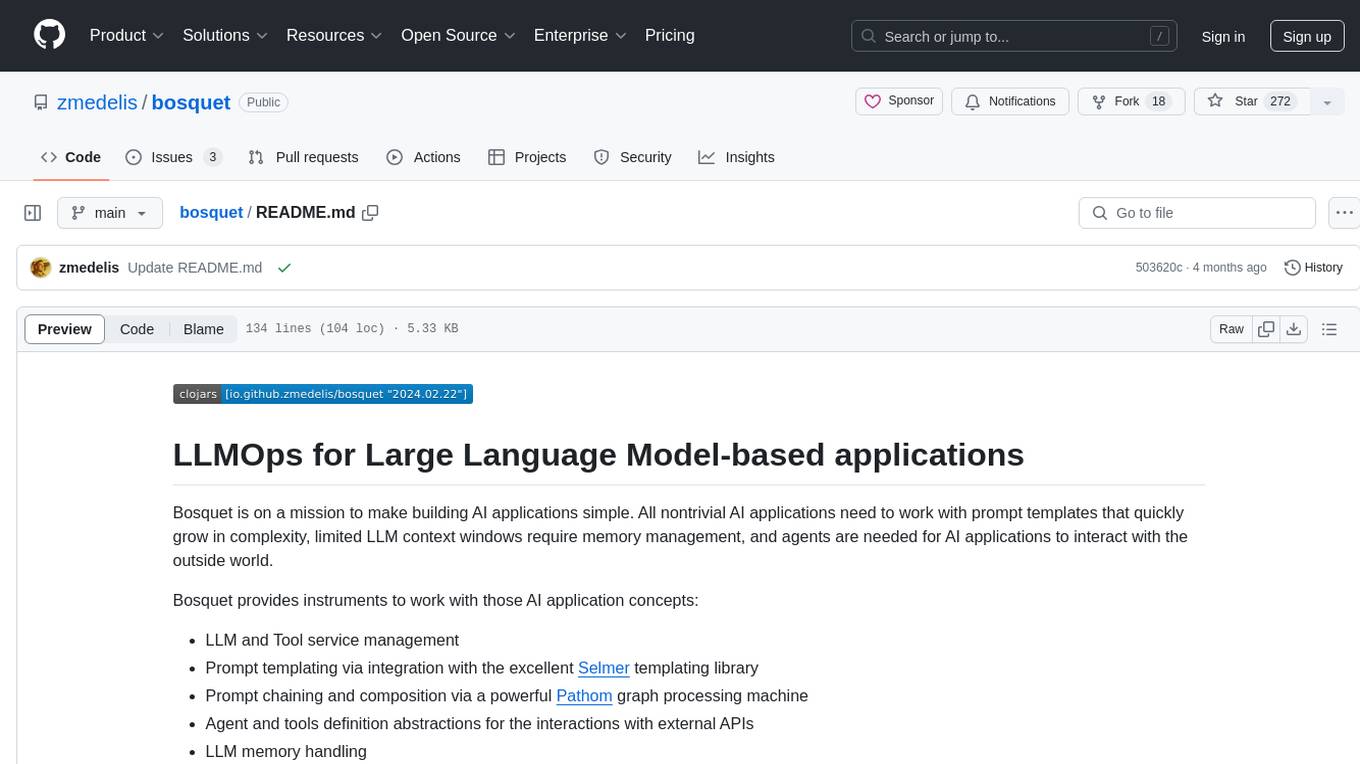
bosquet
Bosquet is a tool designed for LLMOps in large language model-based applications. It simplifies building AI applications by managing LLM and tool services, integrating with Selmer templating library for prompt templating, enabling prompt chaining and composition with Pathom graph processing, defining agents and tools for external API interactions, handling LLM memory, and providing features like call response caching. The tool aims to streamline the development process for AI applications that require complex prompt templates, memory management, and interaction with external systems.
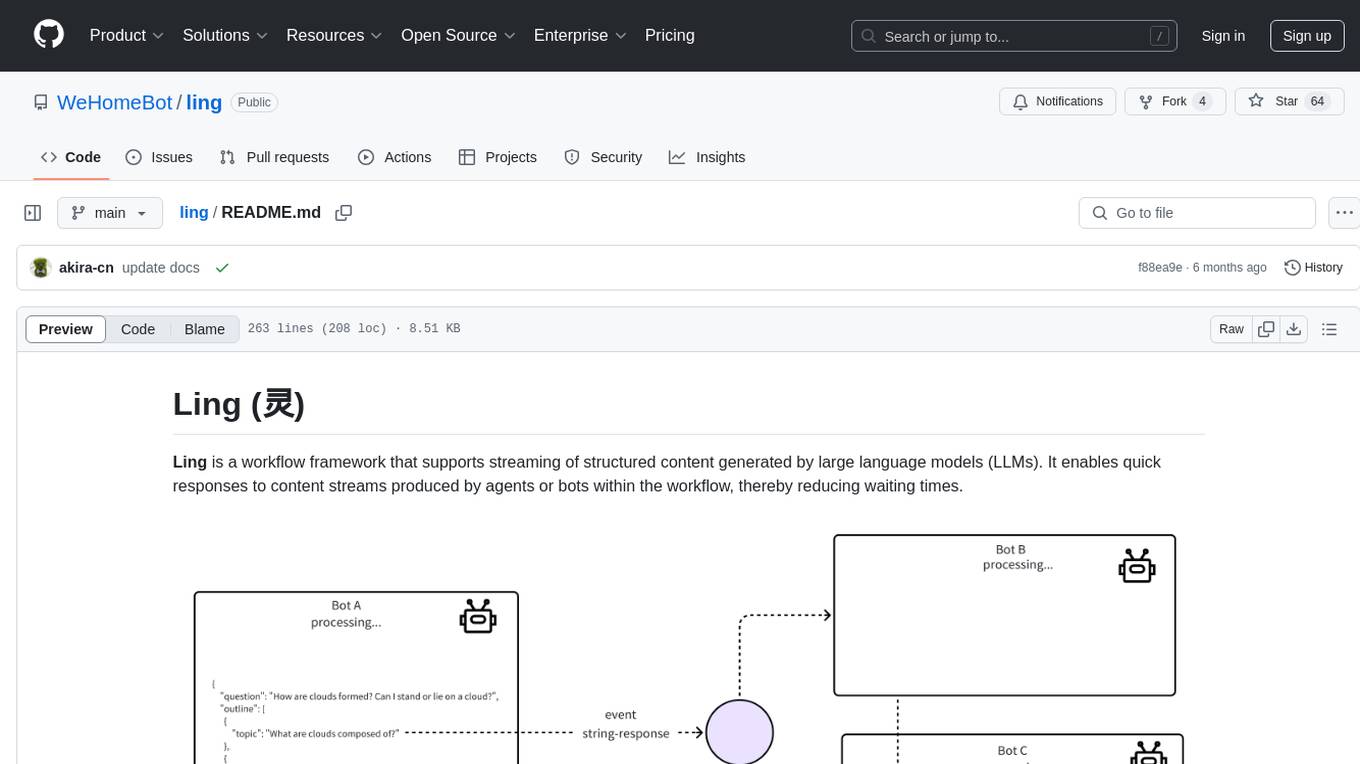
ling
Ling is a workflow framework supporting streaming of structured content from large language models. It enables quick responses to content streams, reducing waiting times. Ling parses JSON data streams character by character in real-time, outputting content in jsonuri format. It facilitates immediate front-end processing by converting content during streaming input. The framework supports data stream output via JSONL protocol, correction of token errors in JSON output, complex asynchronous workflows, status messages during streaming output, and Server-Sent Events.
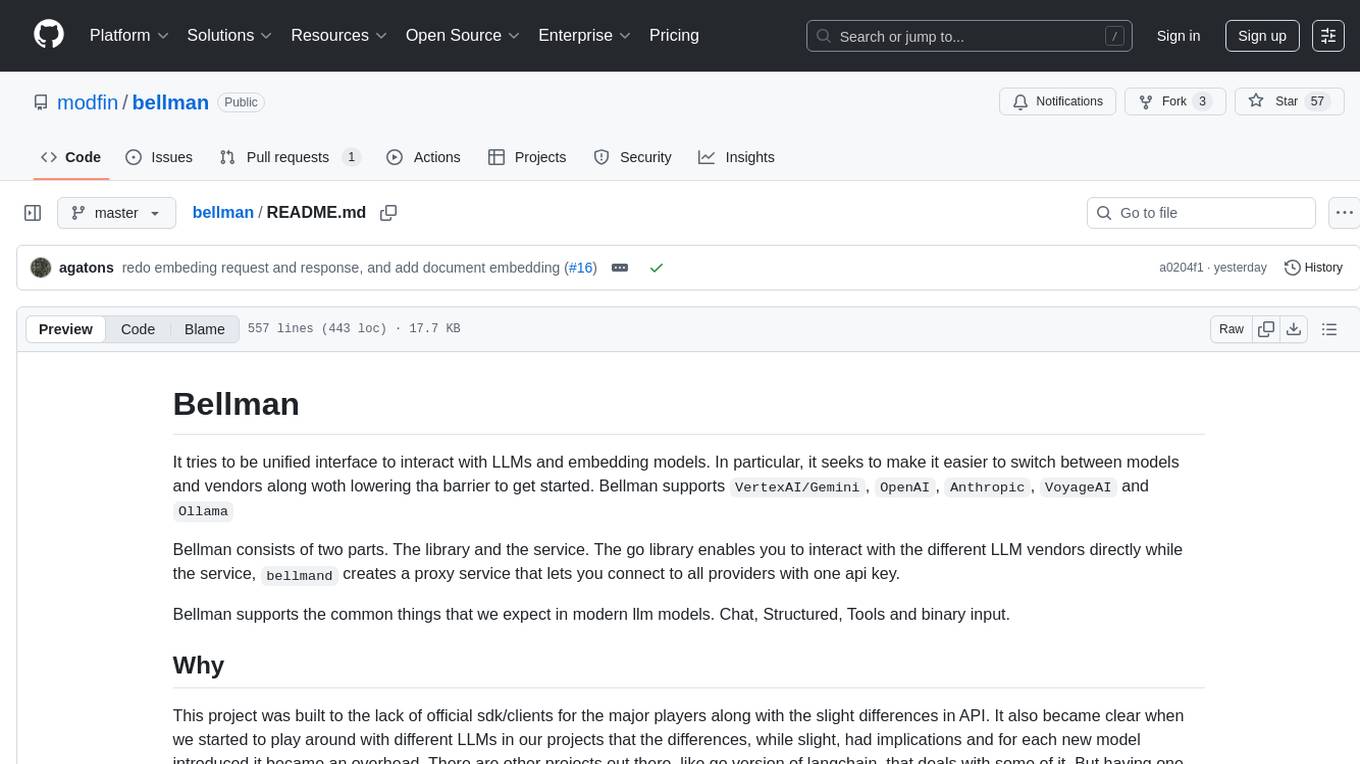
bellman
Bellman is a unified interface to interact with language and embedding models, supporting various vendors like VertexAI/Gemini, OpenAI, Anthropic, VoyageAI, and Ollama. It consists of a library for direct interaction with models and a service 'bellmand' for proxying requests with one API key. Bellman simplifies switching between models, vendors, and common tasks like chat, structured data, tools, and binary input. It addresses the lack of official SDKs for major players and differences in APIs, providing a single proxy for handling different models. The library offers clients for different vendors implementing common interfaces for generating and embedding text, enabling easy interchangeability between models.
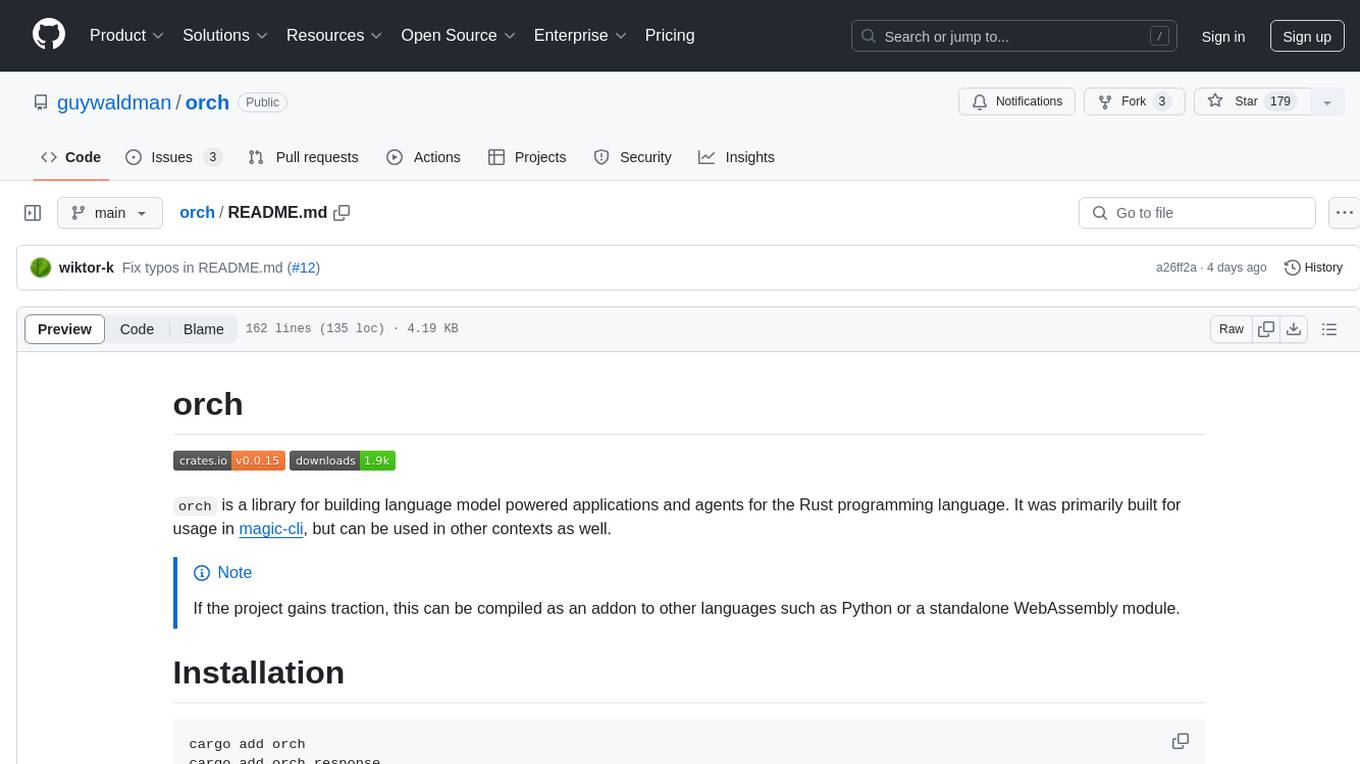
orch
orch is a library for building language model powered applications and agents for the Rust programming language. It can be used for tasks such as text generation, streaming text generation, structured data generation, and embedding generation. The library provides functionalities for executing various language model tasks and can be integrated into different applications and contexts. It offers flexibility for developers to create language model-powered features and applications in Rust.
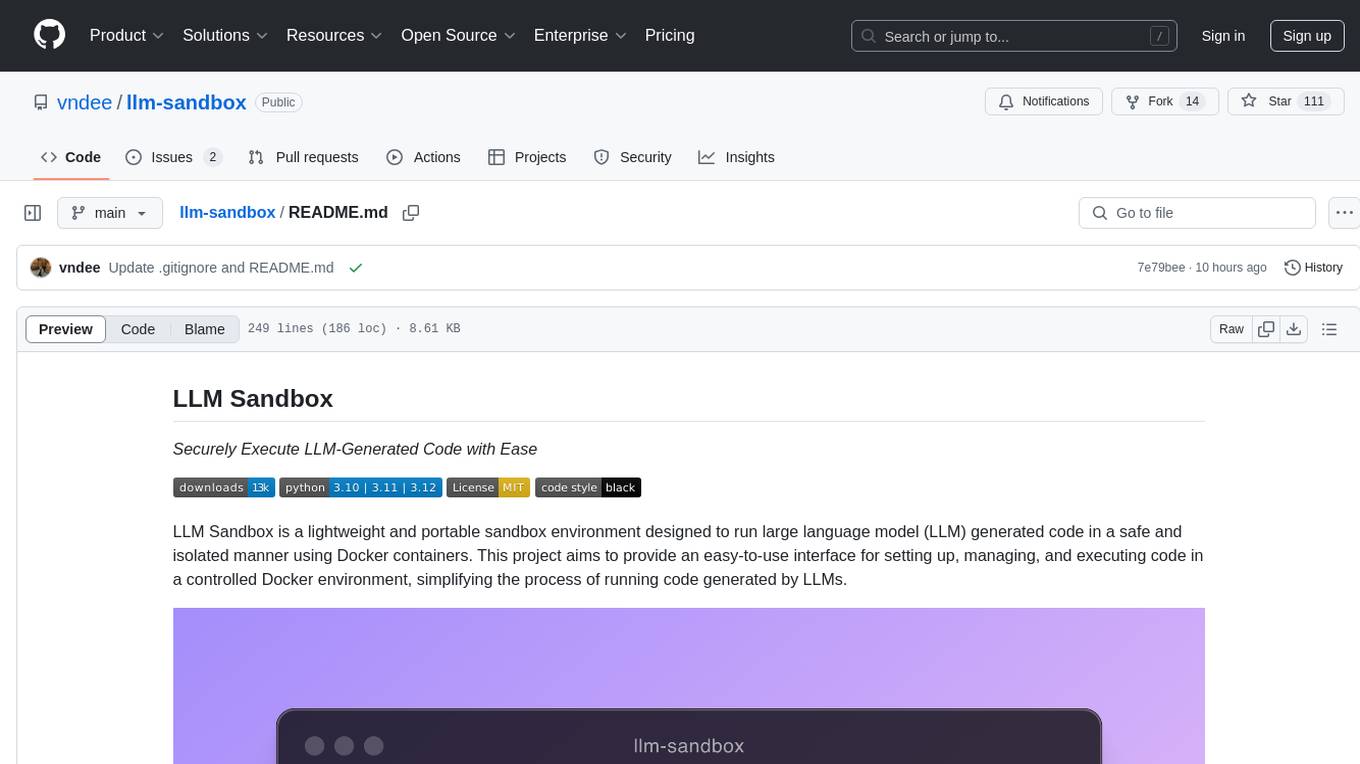
llm-sandbox
LLM Sandbox is a lightweight and portable sandbox environment designed to securely execute large language model (LLM) generated code in a safe and isolated manner using Docker containers. It provides an easy-to-use interface for setting up, managing, and executing code in a controlled Docker environment, simplifying the process of running code generated by LLMs. The tool supports multiple programming languages, offers flexibility with predefined Docker images or custom Dockerfiles, and allows scalability with support for Kubernetes and remote Docker hosts.
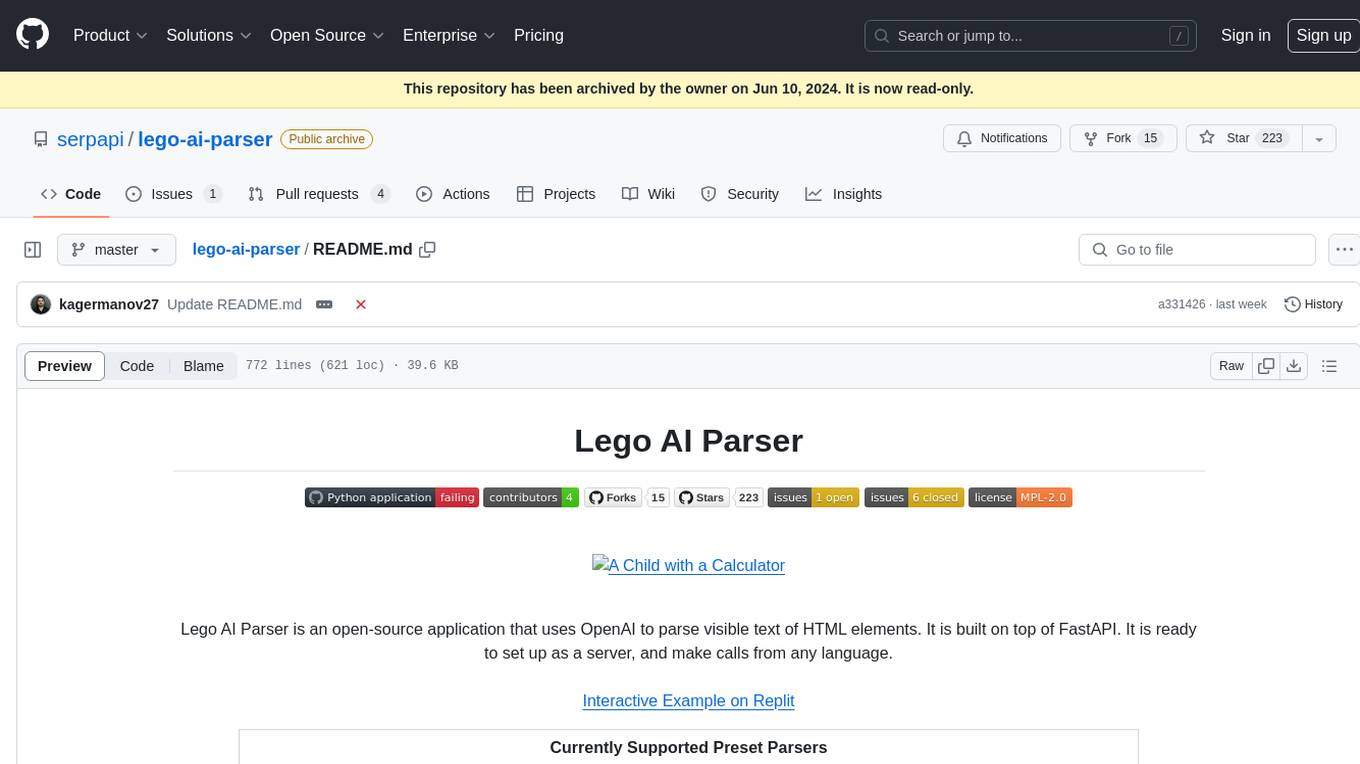
lego-ai-parser
Lego AI Parser is an open-source application that uses OpenAI to parse visible text of HTML elements. It is built on top of FastAPI, ready to set up as a server, and make calls from any language. It supports preset parsers for Google Local Results, Amazon Listings, Etsy Listings, Wayfair Listings, BestBuy Listings, Costco Listings, Macy's Listings, and Nordstrom Listings. Users can also design custom parsers by providing prompts, examples, and details about the OpenAI model under the classifier key.

lagent
Lagent is a lightweight open-source framework that allows users to efficiently build large language model(LLM)-based agents. It also provides some typical tools to augment LLM. The overview of our framework is shown below:
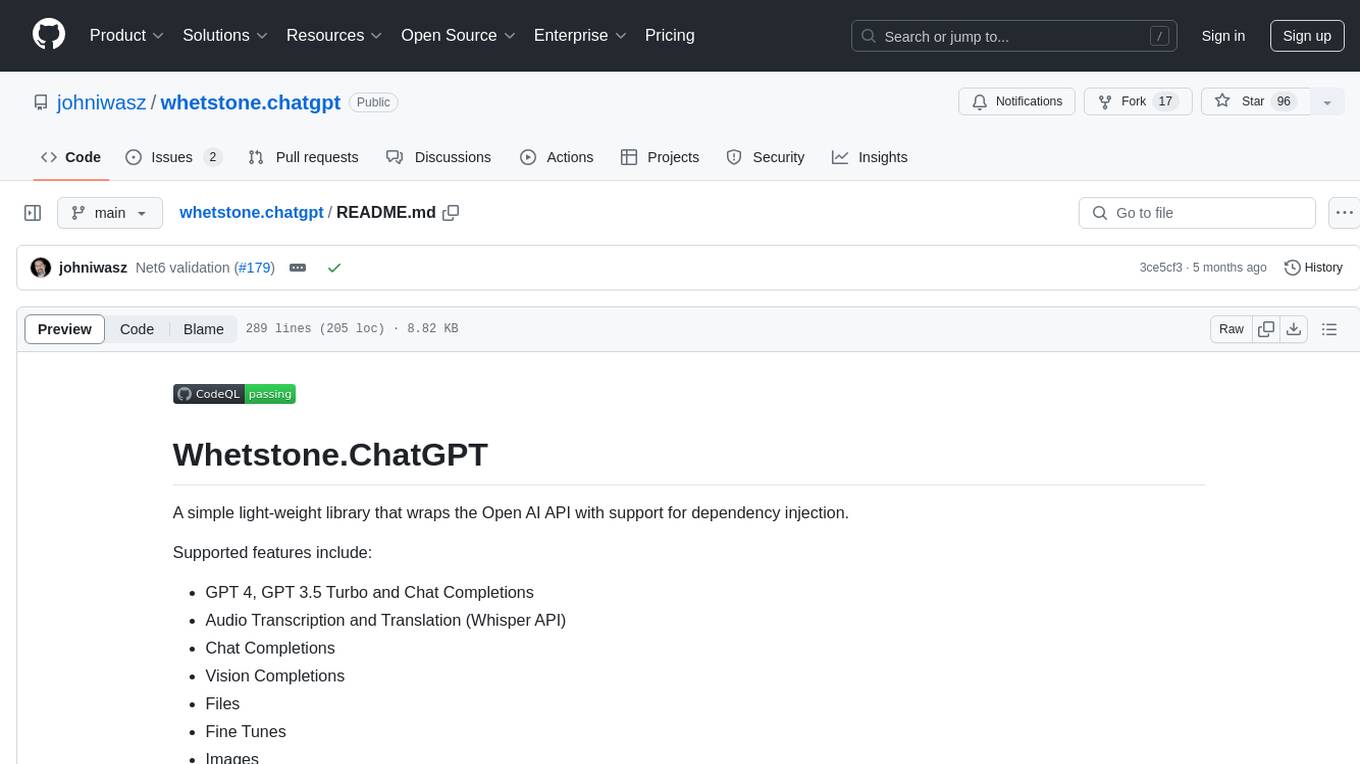
whetstone.chatgpt
Whetstone.ChatGPT is a simple light-weight library that wraps the Open AI API with support for dependency injection. It supports features like GPT 4, GPT 3.5 Turbo, chat completions, audio transcription and translation, vision completions, files, fine tunes, images, embeddings, moderations, and response streaming. The library provides a video walkthrough of a Blazor web app built on it and includes examples such as a command line bot. It offers quickstarts for dependency injection, chat completions, completions, file handling, fine tuning, image generation, and audio transcription.
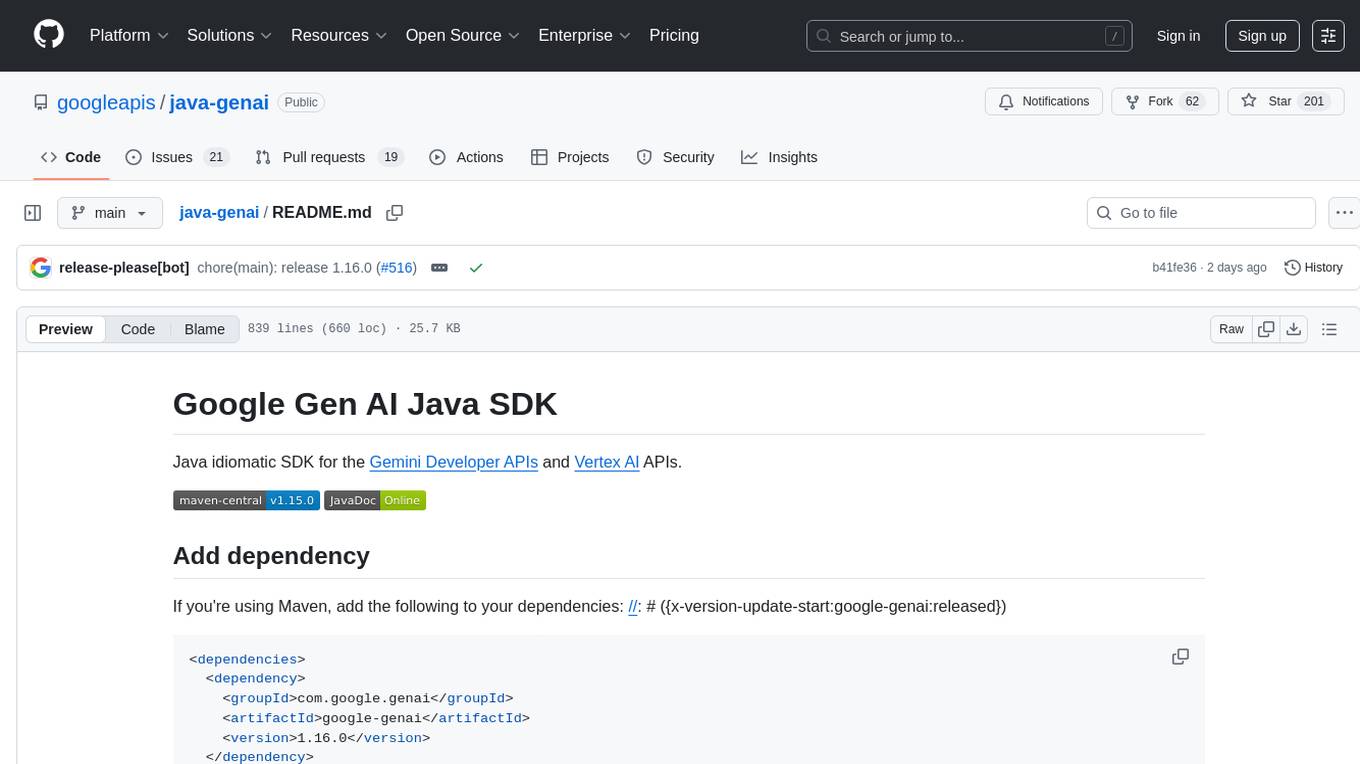
java-genai
Java idiomatic SDK for the Gemini Developer APIs and Vertex AI APIs. The SDK provides a Client class for interacting with both APIs, allowing seamless switching between the 2 backends without code rewriting. It supports features like generating content, embedding content, generating images, upscaling images, editing images, and generating videos. The SDK also includes options for setting API versions, HTTP request parameters, client behavior, and response schemas.
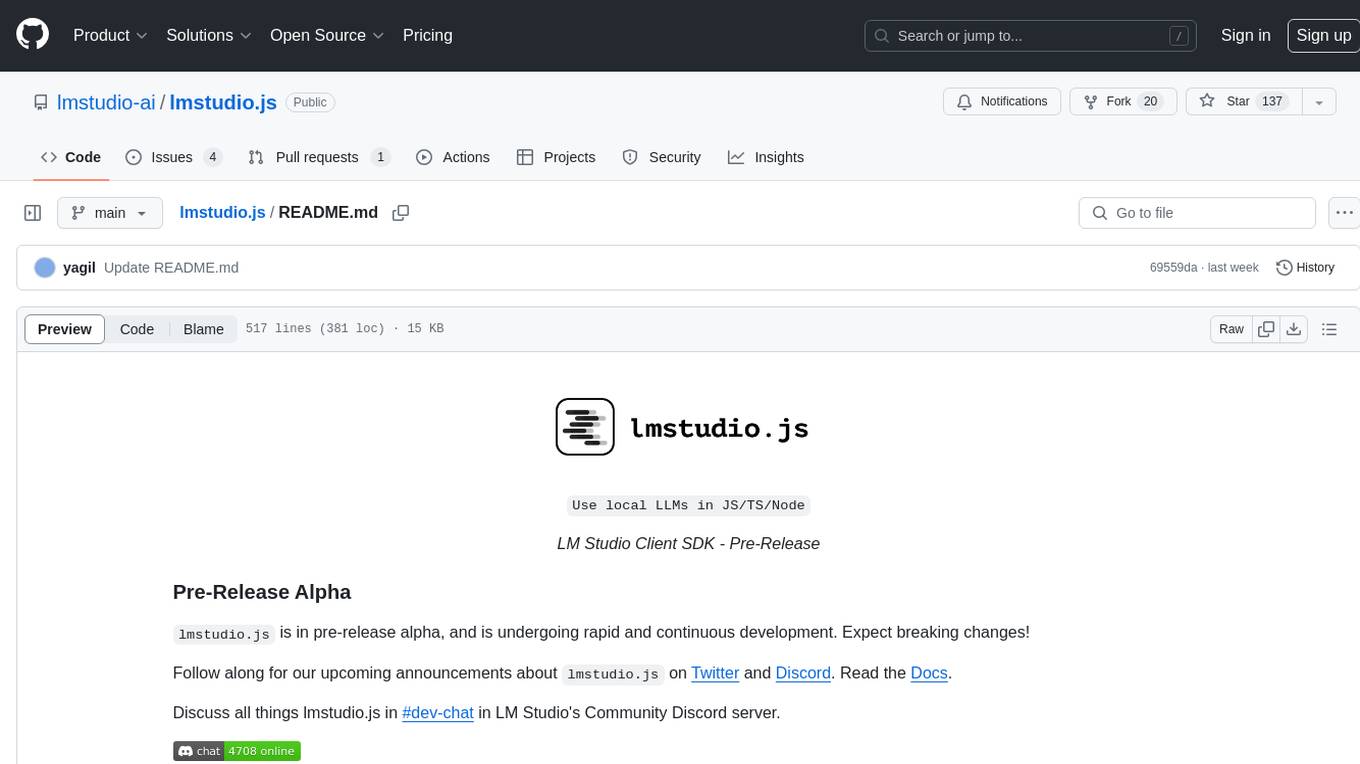
lmstudio.js
lmstudio.js is a pre-release alpha client SDK for LM Studio, allowing users to use local LLMs in JS/TS/Node. It is currently undergoing rapid development with breaking changes expected. Users can follow LM Studio's announcements on Twitter and Discord. The SDK provides API usage for loading models, predicting text, setting up the local LLM server, and more. It supports features like custom loading progress tracking, model unloading, structured output prediction, and cancellation of predictions. Users can interact with LM Studio through the CLI tool 'lms' and perform tasks like text completion, conversation, and getting prediction statistics.

firecrawl
Firecrawl is an API service that takes a URL, crawls it, and converts it into clean markdown. It crawls all accessible subpages and provides clean markdown for each, without requiring a sitemap. The API is easy to use and can be self-hosted. It also integrates with Langchain and Llama Index. The Python SDK makes it easy to crawl and scrape websites in Python code.
For similar tasks

amadeus-java
Amadeus Java SDK provides a rich set of APIs for the travel industry, allowing developers to access various functionalities such as flight search, booking, airport information, and more. The SDK simplifies interaction with the Amadeus API by providing self-contained code examples and detailed documentation. Developers can easily make API calls, handle responses, and utilize features like pagination and logging. The SDK supports various endpoints for tasks like flight search, booking management, airport information retrieval, and travel analytics. It also offers functionalities for hotel search, booking, and sentiment analysis. Overall, the Amadeus Java SDK is a comprehensive tool for integrating Amadeus APIs into Java applications.

amadeus-node
Amadeus Node SDK provides a rich set of APIs for the travel industry. It allows developers to interact with various endpoints related to flights, hotels, activities, and more. The SDK simplifies making API calls, handling promises, pagination, logging, and debugging. It supports a wide range of functionalities such as flight search, booking, seat maps, flight status, points of interest, hotel search, sentiment analysis, trip predictions, and more. Developers can easily integrate the SDK into their Node.js applications to access Amadeus APIs and build travel-related applications.
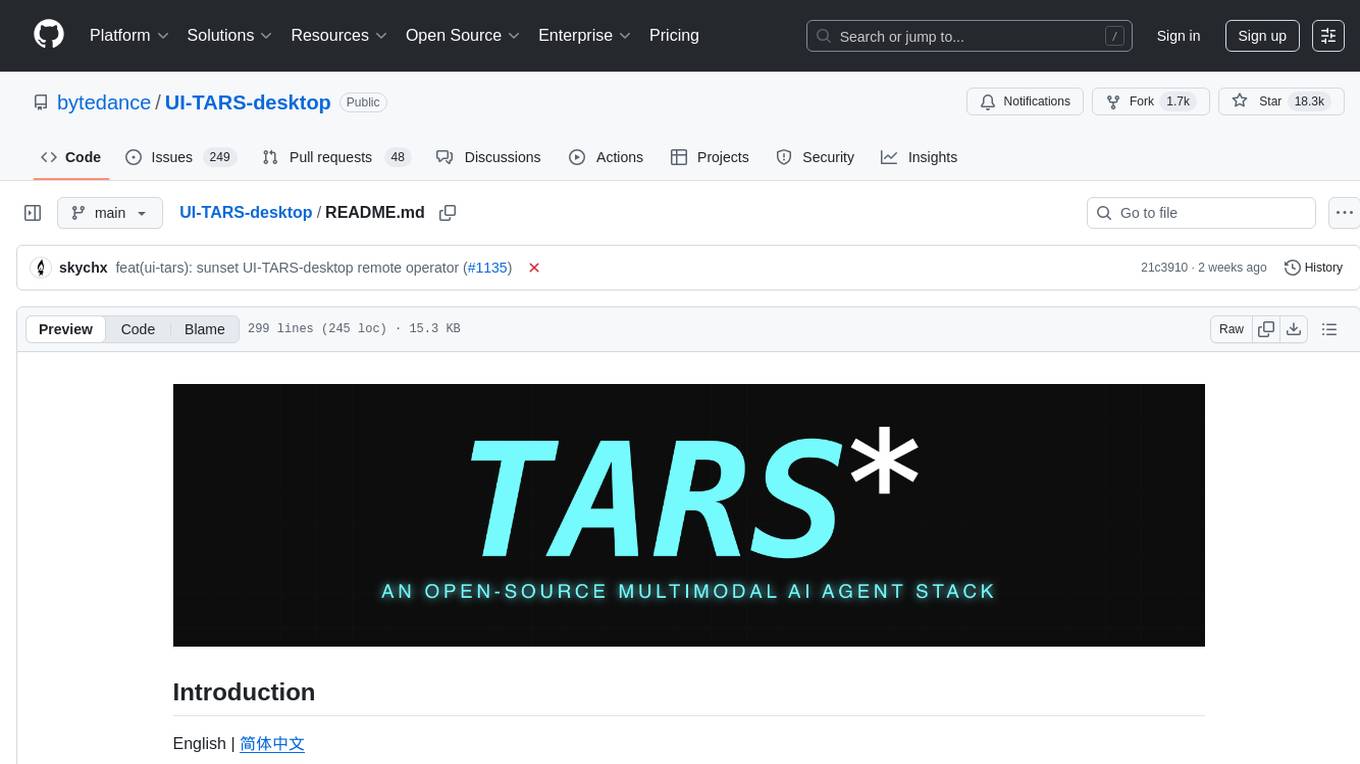
UI-TARS-desktop
UI-TARS-desktop is a desktop application that provides a native GUI Agent based on the UI-TARS model. It offers features such as natural language control powered by Vision-Language Model, screenshot and visual recognition support, precise mouse and keyboard control, cross-platform support (Windows/MacOS/Browser), real-time feedback and status display, and private and secure fully local processing. The application aims to enhance the user's computer experience, introduce new browser operation features, and support the advanced UI-TARS-1.5 model for improved performance and precise control.
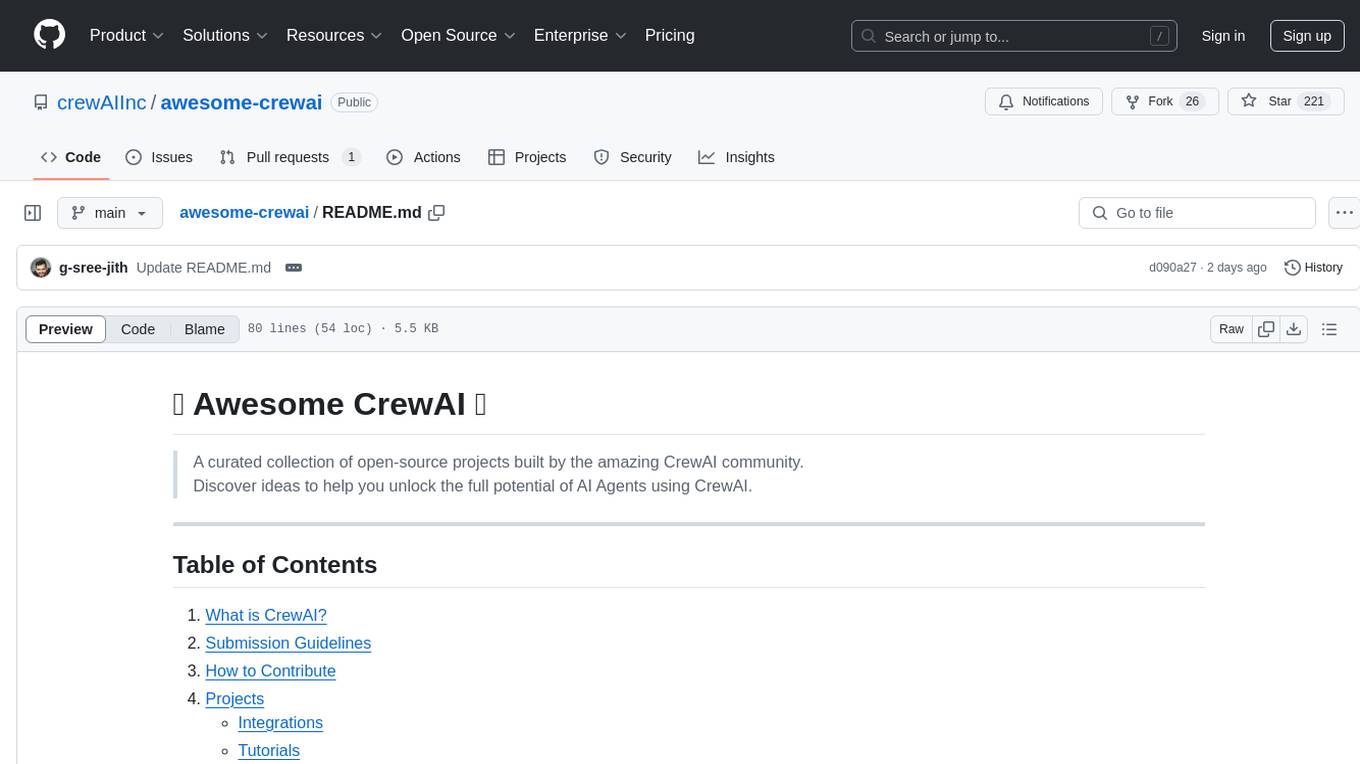
awesome-crewai
Awesome CrewAI is a curated collection of open-source projects built by the CrewAI community, aimed at unlocking the full potential of AI agents for supercharging business processes and decision-making. It includes integrations, tutorials, and tools that showcase the capabilities of CrewAI in various domains.
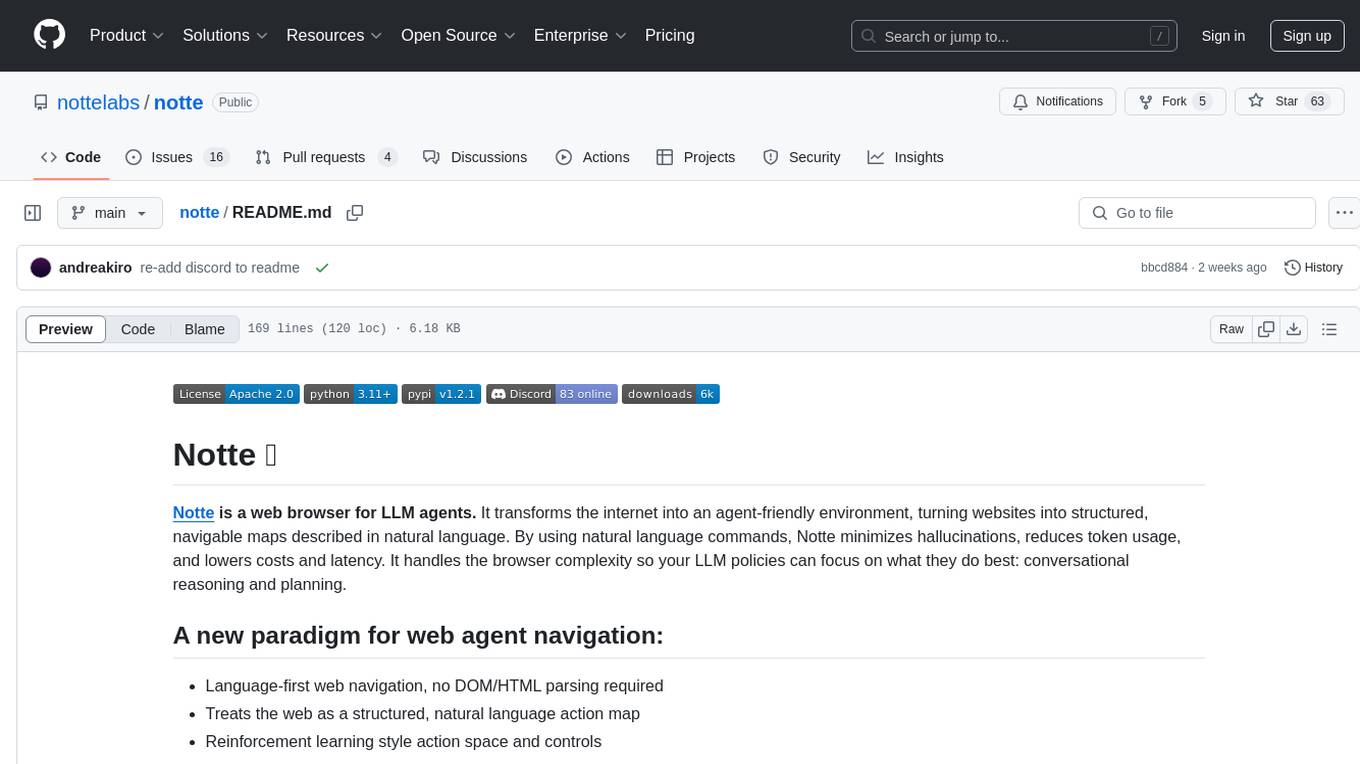
notte
Notte is a web browser designed specifically for LLM agents, providing a language-first web navigation experience without the need for DOM/HTML parsing. It transforms websites into structured, navigable maps described in natural language, enabling users to interact with the web using natural language commands. By simplifying browser complexity, Notte allows LLM policies to focus on conversational reasoning and planning, reducing token usage, costs, and latency. The tool supports various language model providers and offers a reinforcement learning style action space and controls for full navigation control.
For similar jobs
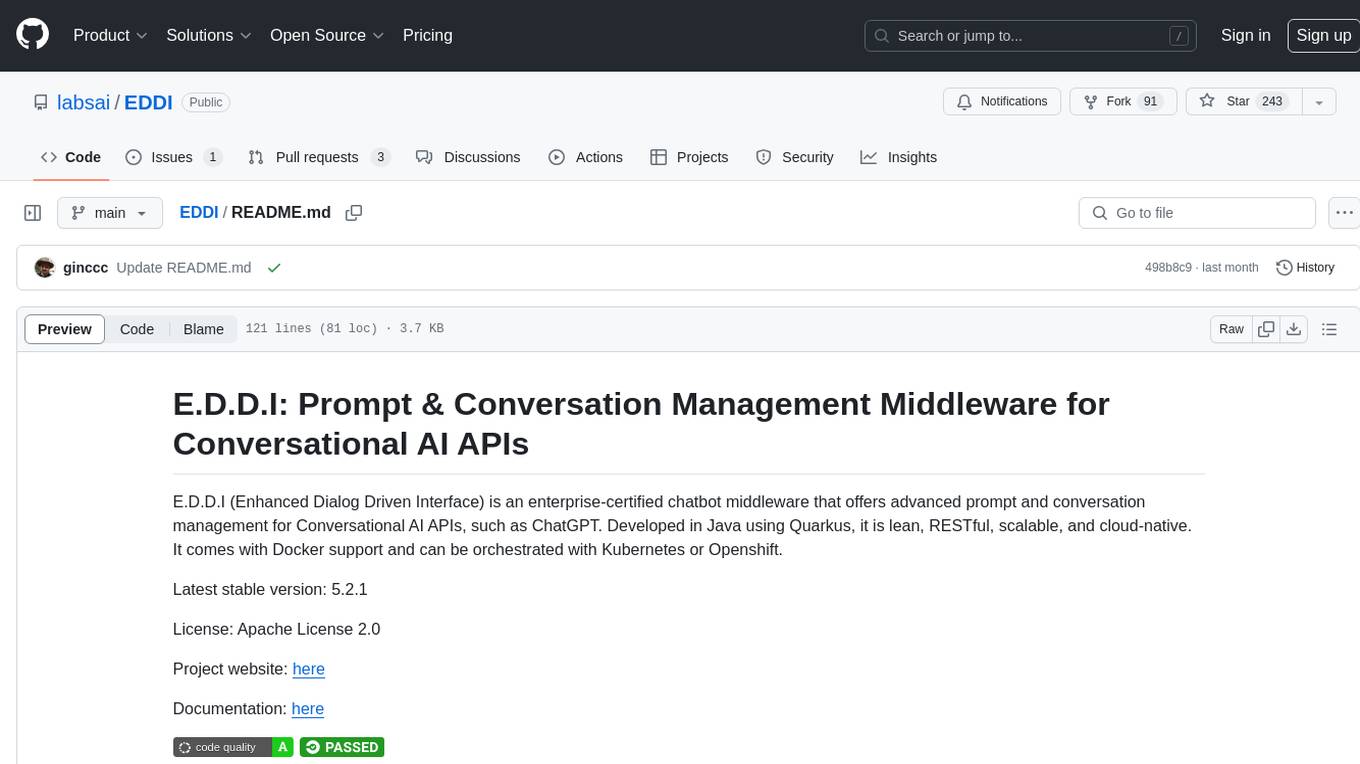
EDDI
E.D.D.I (Enhanced Dialog Driven Interface) is an enterprise-certified chatbot middleware that offers advanced prompt and conversation management for Conversational AI APIs. Developed in Java using Quarkus, it is lean, RESTful, scalable, and cloud-native. E.D.D.I is highly scalable and designed to efficiently manage conversations in AI-driven applications, with seamless API integration capabilities. Notable features include configurable NLP and Behavior rules, support for multiple chatbots running concurrently, and integration with MongoDB, OAuth 2.0, and HTML/CSS/JavaScript for UI. The project requires Java 21, Maven 3.8.4, and MongoDB >= 5.0 to run. It can be built as a Docker image and deployed using Docker or Kubernetes, with additional support for integration testing and monitoring through Prometheus and Kubernetes endpoints.
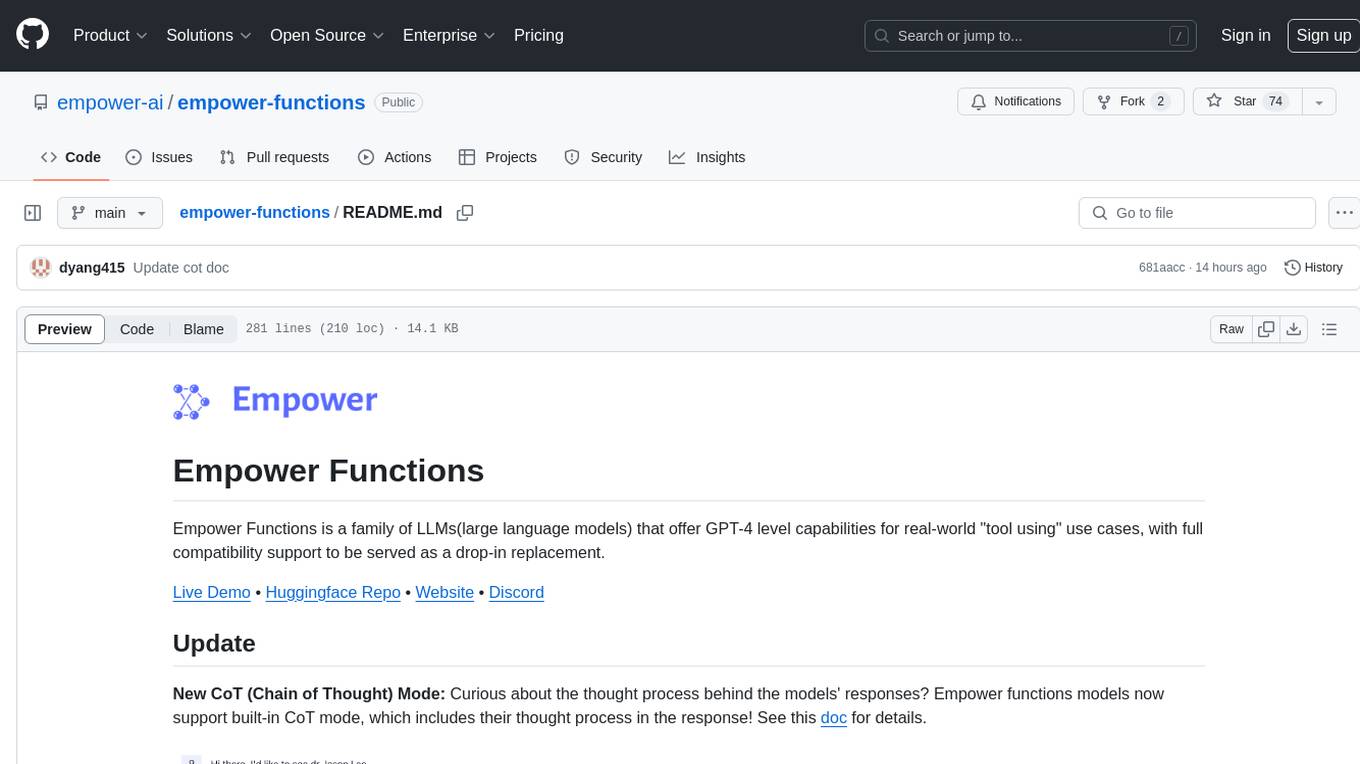
empower-functions
Empower Functions is a family of large language models (LLMs) that provide GPT-4 level capabilities for real-world 'tool using' use cases. These models offer compatibility support to be used as drop-in replacements, enabling interactions with external APIs by recognizing when a function needs to be called and generating JSON containing necessary arguments based on user inputs. This capability is crucial for building conversational agents and applications that convert natural language into API calls, facilitating tasks such as weather inquiries, data extraction, and interactions with knowledge bases. The models can handle multi-turn conversations, choose between tools or standard dialogue, ask for clarification on missing parameters, integrate responses with tool outputs in a streaming fashion, and efficiently execute multiple functions either in parallel or sequentially with dependencies.
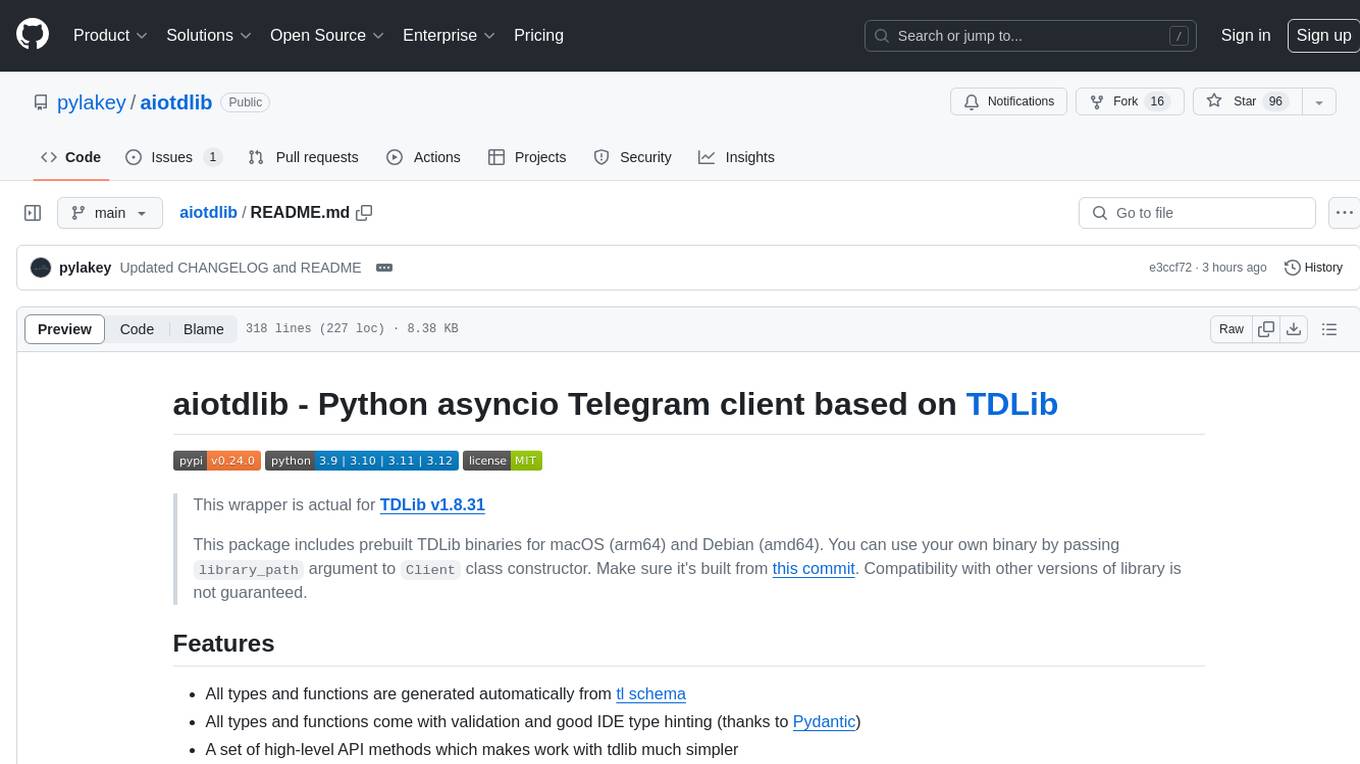
aiotdlib
aiotdlib is a Python asyncio Telegram client based on TDLib. It provides automatic generation of types and functions from tl schema, validation, good IDE type hinting, and high-level API methods for simpler work with tdlib. The package includes prebuilt TDLib binaries for macOS (arm64) and Debian Bullseye (amd64). Users can use their own binary by passing `library_path` argument to `Client` class constructor. Compatibility with other versions of the library is not guaranteed. The tool requires Python 3.9+ and users need to get their `api_id` and `api_hash` from Telegram docs for installation and usage.

amadeus-java
Amadeus Java SDK provides a rich set of APIs for the travel industry, allowing developers to access various functionalities such as flight search, booking, airport information, and more. The SDK simplifies interaction with the Amadeus API by providing self-contained code examples and detailed documentation. Developers can easily make API calls, handle responses, and utilize features like pagination and logging. The SDK supports various endpoints for tasks like flight search, booking management, airport information retrieval, and travel analytics. It also offers functionalities for hotel search, booking, and sentiment analysis. Overall, the Amadeus Java SDK is a comprehensive tool for integrating Amadeus APIs into Java applications.
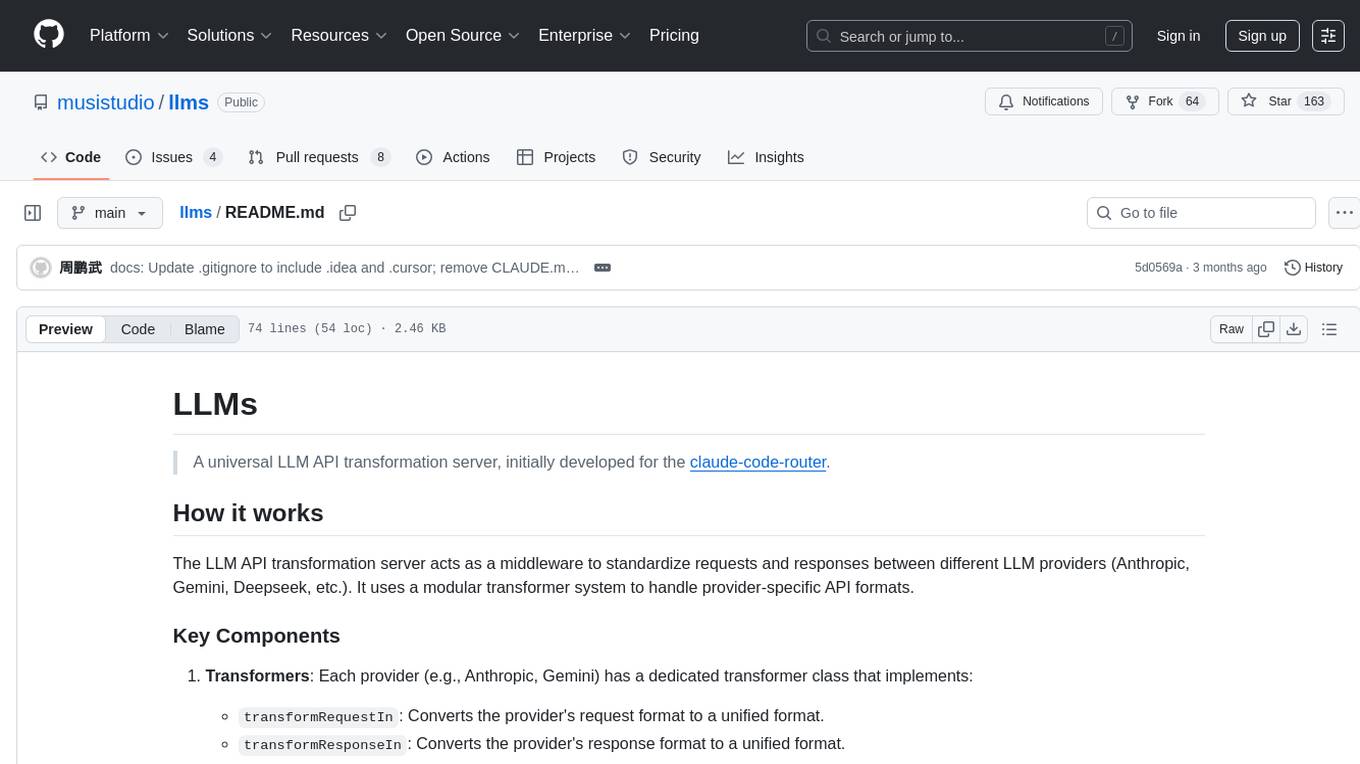
llms
LLMs is a universal LLM API transformation server designed to standardize requests and responses between different LLM providers such as Anthropic, Gemini, and Deepseek. It uses a modular transformer system to handle provider-specific API formats, supporting real-time streaming responses and converting data into standardized formats. The server transforms requests and responses to and from unified formats, enabling seamless communication between various LLM providers.

java-genai
Java idiomatic SDK for the Gemini Developer APIs and Vertex AI APIs. The SDK provides a Client class for interacting with both APIs, allowing seamless switching between the 2 backends without code rewriting. It supports features like generating content, embedding content, generating images, upscaling images, editing images, and generating videos. The SDK also includes options for setting API versions, HTTP request parameters, client behavior, and response schemas.
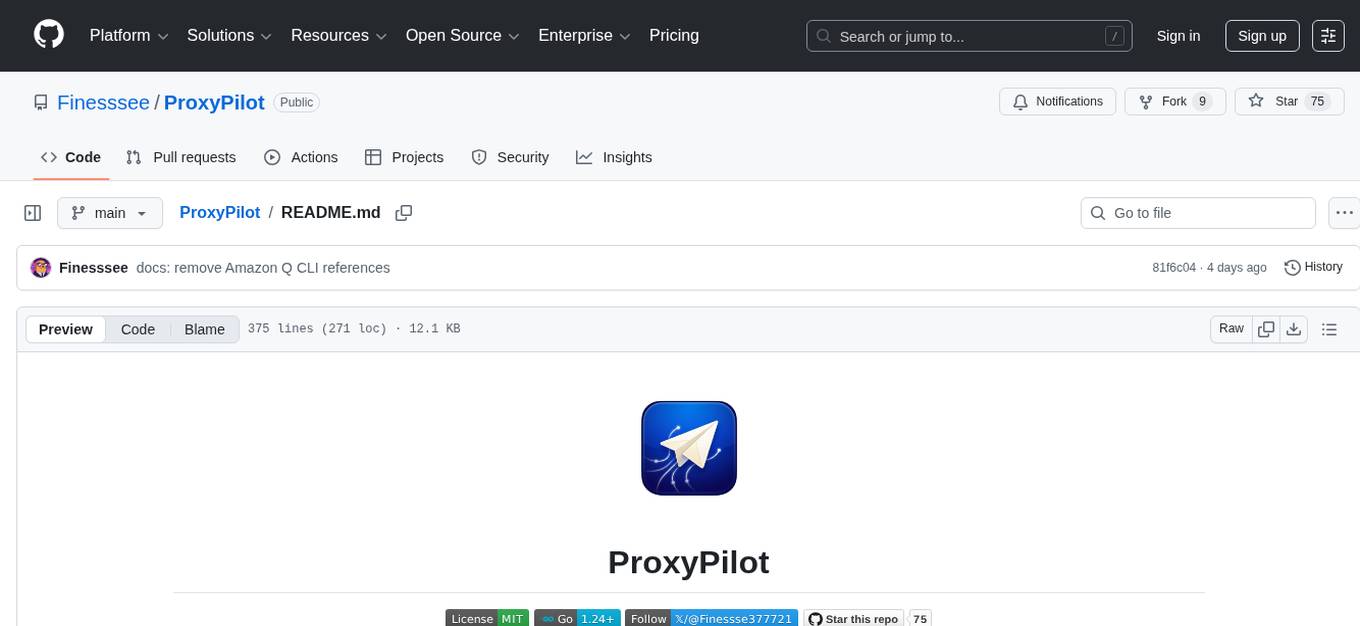
ProxyPilot
ProxyPilot is a powerful local API proxy tool built in Go that eliminates the need for separate API keys when using Claude Code, Codex, Gemini, Kiro, and Qwen subscriptions with any AI coding tool. It handles OAuth authentication, token management, and API translation automatically, providing a single server to route requests. The tool supports multiple authentication providers, universal API translation, tool calling repair, extended thinking models, OAuth integration, multi-account support, quota auto-switching, usage statistics tracking, context compression, agentic harness for coding agents, session memory, system tray app, auto-updates, rollback support, and over 60 management APIs. ProxyPilot also includes caching layers for response and prompt caching to reduce latency and token usage.
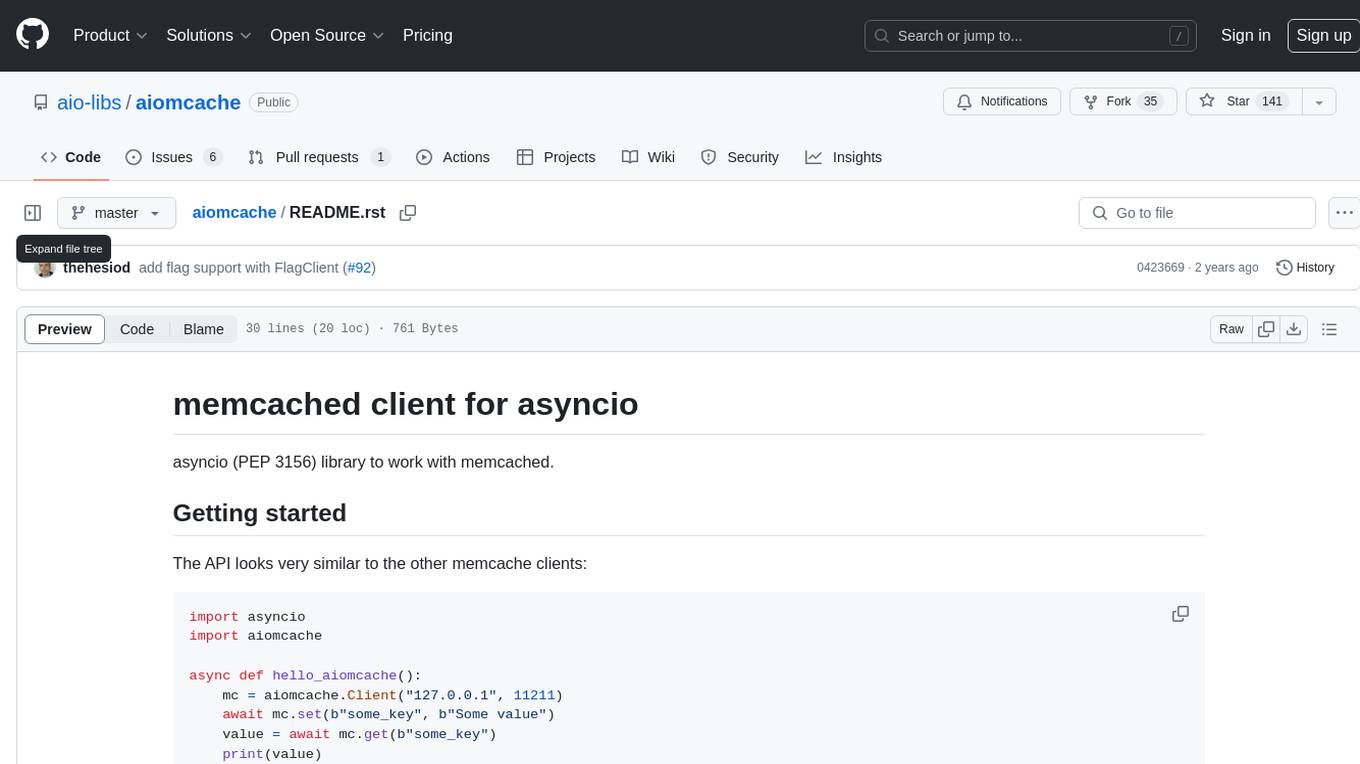
aiomcache
aiomcache is a Python library that provides an asyncio (PEP 3156) interface to work with memcached. It allows users to interact with memcached servers asynchronously, making it suitable for high-performance applications that require non-blocking I/O operations. The library offers similar functionality to other memcache clients and includes features like setting and getting values, multi-get operations, and deleting keys. Version 0.8 introduces the `FlagClient` class, which enables users to register callbacks for setting or processing flags, providing additional flexibility and customization options for working with memcached servers.

